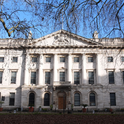Within hours of the news that a general election will be held on 8th June, First Minister Nicola Sturgeon stated that her party’s main pitch to voters will be to ask them to endorse her plans for a second referendum on Scottish independence. As such, the Scottish electorate now faces a stark choice: the narrow, tunnel-vision politics of the Scottish National Party and their obsessive push for independence, or a stable government under the Conservatives which works for the whole country.
A vote for the Scottish Conservatives in June will do two things. First, it will send a clear message that the majority of Scots are opposed to revisiting the arguments of 2014, when Scotland voted decisively to remain in the UK. Second, it will also strengthen Westminster’s hand to negotiate the terms of Brexit on behalf of the whole of the UK.
Our country already has enough uncertainty hanging over it. The mere threat of a second referendum has already caused negative growth in Scotland in the last quarter—despite positive growth in the rest of the UK—and raised the possibility of a return to recession. That is just one reason why the opinion polls are showing that, at the most, only 41 per cent of Scots want a second referendum.
After Theresa May made her announcement, the pound surged to a six-month high. The Centre for Economics and Business Research has predicted that an increased Conservative majority would bring greater certainty and could boost the economy by encouraging firms to invest in the UK. This is a significant vote of confidence in the current UK government.
Like the rest of the UK, Scotland desperately needs this stability and for its government to focus on the day job and the issues that matter, not a headlong push towards more division. Issues like the fact that we do not have enough trained doctors or that our police force has a budgetary black hole of £200m. Or that SNP policies mean we will pay higher income tax and business rates in an economy that is growing at only a third of the UK rate.
In my own portfolio area of education, there are 4,000 fewer teachers than when the SNP came to power, and 152,000 college places have been cut, Scotland’s poorest children are two to three years behind those from more affluent backgrounds and the most recent PISA education rankings have confirmed that Scotland has fallen behind England, Northern Ireland, and even Estonia and Poland.
The political landscape in Scotland has changed dramatically in the two years since the last Westminster election and the SNP lost its majority at Holyrood last year. Amid rumours of a post-election alliance with the SNP, neither Labour nor the Liberal Democrats can be trusted to defend the Union and both parties now allow their members to campaign for independence.
In areas such as Perthshire, Moray, Aberdeenshire and the Borders, Nationalist MPs will feel under threat after the Conservatives made major inroads at last year’s Holyrood elections. Indeed, there is now a distinct possibility that some of the SNP’s more experienced members at Westminster will soon be out of a job.
On 8th June, the Conservatives will gain a number of seats at the SNP’s expense, which would seriously undermine its case for another independence vote between autumn 2018 and spring 2019. Only a vote for the Conservatives will deliver the stability required to get us through Brexit and beyond towards a successful future.
Why Scots should vote Conservative in June
We need stability, not another divisive referendum on independence
April 25, 2017

The SNP is "obsessed" with independence, writes Smith ©Stefan Rousseau/PA Archive/PA Images











